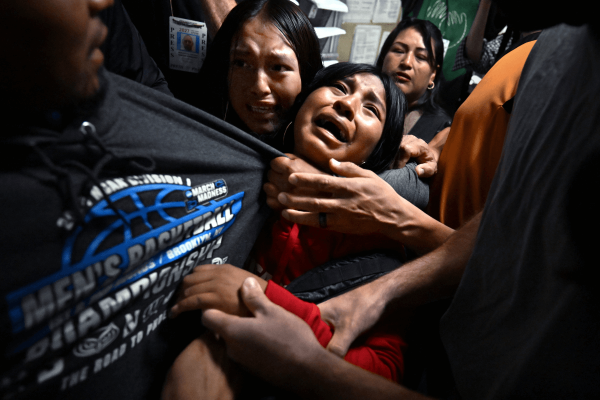Last week the Trump administration announced Operation Midway Blitz, which extends the surge of ICE agents sent to Los Angeles and Washington, D.C., into Chicago; additional ICE surges are happening in Boston and are planned for Memphis. This increased ICE activity follows an alarming Supreme Court shadow docket ruling that permits the administration to stop people on the basis of personal appearance, language, or type of employment. In other words, racial profiling is now explicitly permissible for immigration officials.
If your life is proceeding basically as normal—school drop-offs, daily commutes, medical appointments, visits with grandchildren, stressful jobs, or the daily rhythms of life—it can be hard to remember the fear that many of our immigrant neighbors now feel. Despite my job leading a social justice organization, I’ll confess that I’m not immune from the temptation myself.
The most vulnerable among us do not have the luxury of continuing as normal.
But the most vulnerable among us do not have the luxury of continuing as normal. Try to imagine the terror of armed, masked agents ripping you out of your normal routine, at school drop-offs, daily commutes, medical appointments, visits with grandchildren, or your job—all places where people have been apprehended. While the administration often uses the pretense that they are apprehending violent offenders, only about half of those in ICE custody have been charged or convicted of any crime—violent or otherwise. This sense of terror is especially strong for undocumented people, but it also includes legal residents, folks who recently lost their Temporary Protected Status, and even citizens who reasonably fear that their activism or simply their appearance could make them targets of abduction and detention, often without due process.
These increasingly cruel and aggressive tactics demand more than just sad sighs. They demand a faith-rooted commitment to serve as our neighbor’s keeper through concrete and courageous acts of care, mutual aid, and moral resistance. They demand a surge of solidarity.
Living the Great Commandment
I believe in the rule of law and have been advocating for decades for humane, comprehensive, and effective fixes to our broken immigration system, but checkpoints that racially profile people and masked ICE agents abducting people on the streets show anything but a commitment to the rule of law. Have we not learned from the ugly history of “papers, please” and other pernicious forms of racial profiling?
Much of this tragedy can be out of sight and out of mind. We hear some horror stories in the news, but they feel removed from our reality. It’s not that we don’t care, exactly, but what does this have to do with us? The reality is that those of us who are not immigrants have connections to immigrant or migrant communities. Maybe a close relative, friend, a colleague, a neighbor, someone in your church, or a parent at your kid’s school came here from another country. And whether you realize it or not, you almost certainly interact with immigrants as you participate in your local economy, whether it’s a store clerk, childcare worker, food grower, Uber driver, and so much more.
Whether or not we recognize them, migrants and immigrants are our neighbors, people made in God’s image who are worthy of dignity. As Christians, they deserve our solidarity.
Solidarity is how we as Christians tell others that they are not alone, that we stand with them.
Solidarity is the lived expression of the Great Commandment to love our neighbors as ourselves. It is how we obey Jesus’ call in Matthew 25 to care for and protect the “least of these” among us, including immigrants. It is an antidote to isolation, apathy, and parochialism, emphasizing our interconnectedness and the moral responsibility to affirm and protect the dignity of everyone, particularly those who are most vulnerable. Solidarity is how we as Christians tell others that they are not alone, that we stand with them.
The Old Testament contains powerful admonitions about the duty of believers to intervene in situations of suffering and injustice. Proverbs 31:8-9 tells us to “speak up for those who cannot speak for themselves, for the rights of all who are destitute. Speak up and judge fairly; defend the rights of the poor and needy.” Isaiah 58 famously exhorts us to show our reverence to God specifically through action on behalf of those in marginalized situations: “Is not this the kind of fasting I have chosen: to loose the chains of injustice, and untie the cords of the yoke, to set the oppressed free and break every yoke?” He goes on to say that believers should “do away with the yoke of oppression” and “satisfy the needs of the oppressed” and emphasizes that our wholeness, our flourishing, is tied to the flourishing of the oppressed and most vulnerable.
Jesus also powerfully warned us against letting the entanglements of daily life distract us from our duty as believers. In Matthew 13, he tells the parable of the sower and warns us about the three types of seeds that did not bear fruit, which represent different ways that people can receive but ultimately fail to follow Jesus’ teachings. In the context of our responsibility to act when we see our siblings being oppressed, I think about the seed that “fell among thorns, which grew up and choked the plants” (v. 7). Jesus later explains that this type of seed “refers to someone who hears the word, but the worries of this life and the deceitfulness of wealth choke the word, making it unfruitful” (v. 22). It’s a timely word for this moment.
In addition to Jesus’ teaching, I’ve come into a deeper understanding of solidarity through the Southern African concept of ubuntu, the belief that, as Archbishop Desmond Tutu summarized, “I am, because we are.” At its deepest level, solidarity is rooted in agape love: a selfless and sacrificial love for our neighbor and people who have been made vulnerable by the societies we live in.
What God requires
If you’re not feeling the impact of Trump’s cruel immigration policies on yourself, your loved ones, or your neighbors, you might find yourself afraid of the consequences of taking action for justice. I hear that, and I absolutely get it, but the Bible is clear on that as well. One of the most frequent injunctions throughout all of scripture is “fear not” or “be not afraid.” Of course, that’s much easier said than done, but the good news is that there are plenty of examples from all across the country of what other Christians are doing to demonstrate solidarity with their immigrant neighbors.
For example, in Hyattsville, Md., St. Matthew’s Episcopal Church/Iglesia San Mateo has volunteer door guardians who walk the church grounds during worship service, all to protect parishioners from ICE/CBP agents. Father Vidal Rivas, the head priest at San Mateo, has himself pledged to serve as a standby guardian to 16 children in the congregation should their parents be taken into custody.
In California, where many Catholic immigrants have become fearful of attending Sunday Mass for fear of being swept up in ICE raids that have increasingly taken place at or near houses of worship, Bishop Alberto Rojas of San Bernadino gave his parishioners a dispensation to stay home from services, a rare step and the first by a Catholic leader in Southern California. Meanwhile, faith leaders and community organizers in Los Angeles worked side by side to organize protests against ICE and bear witness to ICE arrests across the city in June.
In Washington, D.C., Catholic Charities has expanded its network of shelters for unhoused people and increased food distribution and paralegal support for migrant and low-income families. Local families here in the nation’s capital are offering solidarity and economic support to fellow parishioners who have had family members detained. Religious leaders in the D.C. area have also written a letter with a simple message: “federal law enforcement keep off our property.”
The bottom line is this: You may not feel directly connected to the immigrant communities and may not know the extent of the fear and violence that is gripping those communities right now, especially in places like D.C., Los Angeles, Chicago, Boston, or Memphis. You or others in your close social circle might even be wondering if what you’ve heard is overblown. You might be wondering what might be required of you, unsure of how to help, or afraid of what may happen if you do. These are real feelings. But they are exactly what authoritarian leaders count on.
We can resist by seeking to empathize with the pain and fear that so many who are experiencing and resolving to act in solidarity with them. That’s how we’ll continue building communities of care where no one fears being left behind by their neighbors, regardless of the Trump administration’s increasingly authoritarian style actions.
The good news is that acts of solidarity come in many forms, from connecting targeted people to legal support, offering to run errands for impacted neighbors, or even just walking their kids to school. Solidarity also includes speaking out to raise awareness and moral urgency around what is happening. And yes, this can mean joining in public resistance like the “We Are All D.C.” that I attended and Sojourners cosponsored earlier this month in our nation’s capital.
The even better news is that when multiplied and combined together, small acts of solidarity are what can cause authoritarian actions to backfire. They provide a countervailing narrative of justice to the current, prevailing narrative that so often dehumanizes and demonizes immigrants and other vulnerable people in our communities. Let us be that counternarrative through our increasingly courageous acts of solidarity.
Got something to say about what you're reading? We value your feedback!





